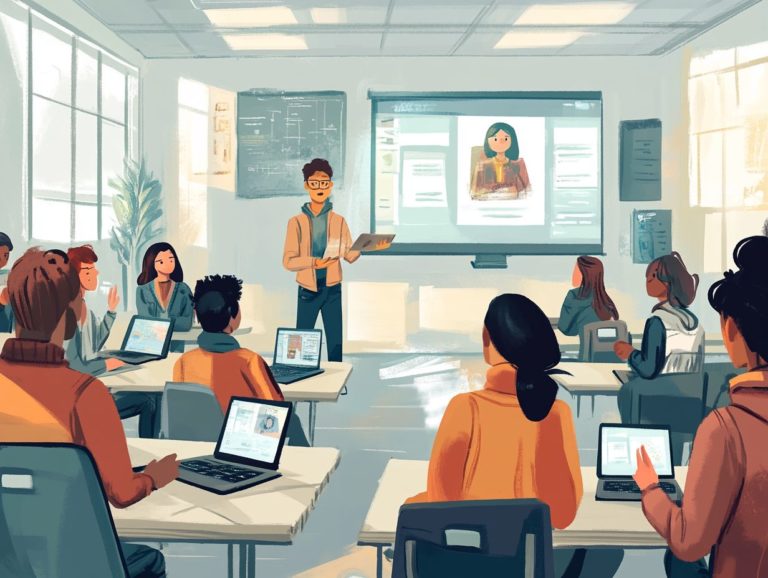5 Online Resources for Associate Degree Research
In today’s digital landscape, the array of online resources available for research is truly remarkable, particularly for those pursuing an associate degree.
From college and university websites to educational YouTube channels, each platform provides distinct insights and information that can significantly enrich your academic journey.
This article delves into five essential online resources, examining their benefits, limitations, and best practices for effective utilization.
Whether you re an experienced researcher or just beginning your exploration, you ll discover valuable tips to confidently navigate this wealth of information.
Contents
Key Takeaways:

- Utilize college and university websites for reliable and up-to-date information on academic programs, admissions, and student resources.
- Access online databases and journals to find scholarly articles, research studies, and other academic resources for in-depth research.
- Explore government websites and databases for credible data and statistics on various topics related to your associate degree research.
1. College and University Websites
College and university websites are very helpful resources as you pursue higher education. They offer a wealth of information on various degree programs, including the top online tools for studying associate degrees and bachelor’s degrees.
These platforms break down financial aid options, tuition costs, and student outcomes linked to accredited institutions. They are essential in guiding you to make well-informed decisions about your academic journey and career ambitions.
You ll find detailed descriptions of each program, which help you grasp the curriculum, faculty expertise, and research opportunities that await you in specific fields of study.
These sites often showcase financial aid resources like the Pell Grant. Quickly explore different funding avenues to ease the financial strain of tuition!
Insights into accreditation provide reassurance about the quality and recognition of a program. Understanding how rankings are determined can greatly influence your experience and post-graduate employment prospects.
Armed with this knowledge, you can confidently choose paths that match your dreams!
2. Online Databases and Journals
Online databases and journals are critical tools for your academic research journey, granting you access to scholarly articles that delve into various facets of educational programs, distance education, and their influence on student outcomes. Additionally, it’s important to consider 5 things to know before enrolling in an associate program to make informed decisions about your education and financial aid opportunities.
Platforms like JSTOR and Google Scholar truly shine, boasting extensive collections of articles reviewed by experts in the field. JSTOR provides a rich archive of academic journals, allowing you to explore historical content. Google Scholar offers a user-friendly interface to discover a diverse range of scholarly articles across multiple disciplines.
Effectively utilizing these databases is paramount in crafting well-informed academic papers. They deepen the quality of your research and ensure that the information you cite is credible.
This credibility becomes particularly vital when addressing program accreditation since the quality of your sources can significantly sway the evaluation process.
3. Government Websites and Databases

Government websites and databases, like those from the U.S. Department of Education and the National Center for Education Statistics, offer invaluable insights into financial aid options, tuition costs, and job placement rates for various degree programs, including the best tools for online associate degree students.
By effectively navigating these resources, you can tap into a wealth of information tailored to your educational needs. This transforms the often-daunting process of choosing a path into a more manageable journey.
Delving into specific reports on financial aid can uncover essential federal programs designed to assist you in financing your education, easing some of the common worries tied to tuition expenses.
Grasping the different types of financial aid grants, loans, and scholarships equips you to make informed decisions that align with your academic and career aspirations, ultimately steering you toward your long-term goals.
4. Online Libraries and Archives
Online libraries and archives are truly invaluable resources for your academic research, offering a treasure trove of materials across various educational topics, including community college programs and 5 reasons to pursue an online associate degree, all while adhering to stringent program accreditation standards.
These digital collections often feature eBooks, peer-reviewed journals, and unique archival materials. This provides you with both depth and breadth for your scholarly inquiries. You can immerse yourself in a wide array of subjects, enabling you to engage in informed discussions and cultivate well-rounded perspectives.
Access to such diverse formats not only enriches your overall learning experience but also encourages critical thinking as you analyze different types of content.
By facilitating seamless access to these resources, online libraries effectively bridge the gap between theoretical knowledge and practical application, ultimately supporting your academic success as you navigate various educational paths.
5. Educational YouTube Channels and Podcasts
Educational YouTube channels and podcasts serve as accessible platforms for your learning journey, featuring content from a variety of esteemed educational institutions. They cover a wide range of topics, from online degrees to enhancing the overall student experience through insightful academic research.
These mediums make information available to everyone and present diverse perspectives on critical issues in education and career development.
For instance, channels like Crash Course and TED-Ed captivate you with engaging video lessons that simplify complex concepts. Podcasts such as The EdSurge Podcast and Career Talks delve into the real-world applications of academic skills.
By supplementing traditional classrooms, these resources enable you to explore subjects at your own pace, discover new interests, and gain invaluable insights from industry experts and educators.
How to Effectively Use These Online Resources for Research?
Effectively utilizing online resources for academic research requires a systematic approach that boosts your student experience and elevates your research outcomes. Start by establishing clear research objectives that will guide your inquiry process.
By pinpointing your specific needs and goals, you’ll tailor your searches more precisely. Using specific and varied search terms will significantly increase your chances of uncovering relevant information.
Make sure your sources are reliable and up-to-date. Cross-reference different resources to enrich your research and provide a more comprehensive understanding of the topic.
By employing these strategies, you’ll confidently navigate the vast landscape of online information, making your academic journey all the more rewarding.
What Are the Benefits of Using Online Resources for Research?
Utilizing online resources for research brings a wealth of advantages your way. You’ll find that access to academic materials is not just enhanced but transformed, paving the way for better student outcomes. For inspiration, check out 5 success stories of online associate degree graduates as you make informed decisions about financial aid and distance education options.
This flexibility enables you to study at your own pace while expanding your understanding through a rich tapestry of viewpoints and data. The vast reservoir of information available online enables you to engage with contemporary studies and the latest findings, which are essential in today s rapidly evolving academic environment.
By tapping into these resources, you’ll make smart choices that can transform your educational journey and career aspirations, ultimately leading to improved academic performance. This thorough preparation lays a solid foundation for your future professional endeavors, ensuring you’re well-equipped to meet the demands of your chosen field.
What Are the Limitations of Online Resources for Research?
Despite their many advantages, online resources for research come with certain limitations that you should be aware of. Some sources may lack reliability, which can negatively impact your experience as a student and compromise the integrity of your academic research.
You might find yourself facing information overload, struggling to navigate through a sea of data and opinions that may not even pertain to your inquiries. Verifying sources can become a daunting task, especially when false or misleading claims are rampant online.
It’s not uncommon to stumble upon outdated or biased information that can distort your understanding of a topic. This is where exercising critical thinking becomes absolutely crucial. You must check if your sources are reliable and distinguish between credible and non-credible information to ensure your academic success.
What Are the Best Practices for Evaluating Online Resources?

Evaluating resources online for academic research is essential, and you should adopt best practices, such as verifying the trustworthiness of the sources, ensuring the proper accreditation of the program, and considering top online colleges offering associate degrees to evaluate how relevant the information is to student outcomes.
To achieve this, start by examining the qualifications and experience of the author on the topic. It is essential to confirm that they have relevant degrees or professional experience that grants authority to their work.
Don t overlook the publication date; the most recent information often aligns better with current trends and findings in various fields.
Check if the article has gone through peer review. Those that have faced this rigorous scrutiny tend to be more reliable.
By using resources recognized by reputable educational institutions, you build a foundation of trust in the material. This not only improves the quality of your academic work but also contributes to a more informed educational environment overall.
How Can One Cite Online Resources in Their Research?
Citing online resources in your academic research is vital for upholding academic integrity, and it requires adherence to specific citation styles that can differ based on your institution’s guidelines.
Proper citation does more than just bolster the credibility of your work; it enables readers to trace the origins of the information you present, fostering a culture of transparency in scholarship.
For example, you might use the American Psychological Association (APA) style in the social sciences, while the Modern Language Association (MLA) style is often preferred in the humanities. Meanwhile, the Chicago Manual of Style is a go-to for historians and some social science fields.
To make managing your citations easier and to ensure accuracy, you have a wealth of tools at your disposal. Consider citation management software like Zotero or EndNote, or online resources such as EasyBib and Citation Machine.
These tools simplify the citation process and help you steer clear of unintentional plagiarism, allowing you to focus on what truly matters your research.
What Are the Future Possibilities for Online Resources in Research?
The future of online research resources is incredibly exciting! Advancements in technology are set to elevate distance education and enrich your learning experience with greater interactivity.
You ll find a growing trend in integrating artificial intelligence into academic research, which can streamline data analysis and create personalized learning pathways tailored just for you.
Imagine stepping into virtual reality (VR) learning environments that immerse you in engaging experiences, allowing you to explore complex concepts in ways that spark your curiosity.
The potential for real-time collaboration among students and researchers across diverse geographical locations promises a more inclusive academic community. This environment fosters a tapestry of viewpoints and collaborative problem-solving endeavors that could very well lead to groundbreaking discoveries.







